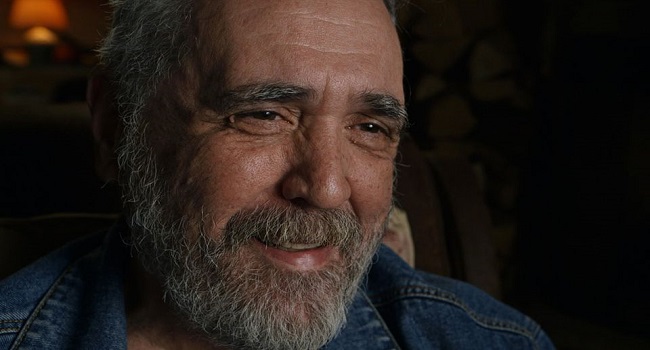In the basement that has haunted Barry Crimmins since he can remember, the acerbic comedian’s tongue falters for a moment as he hums and haws in the darkness. Eventually, unrehearsed words pour out and assemble themselves into a poignant reminder of why he is the perfect subject for Bobcat Goldthwait’s documentary Call Me Lucky. Though the film begins as a seemingly garden-variety portrait of the political satirist and comedy club patron, told mostly through interviews with his friends and family; Goldthwait’s keen directorial eye and editing choices reveal the film’s sinister kernel – one that we won’t fully understand until much later (if ever).
Call Me Lucky opens with home video footage of Barry Crimmins at an anti-war rally protesting Operation Desert Storm. The grainy footage transitions to the gorgeous snowy landscape of Crimmins’ upstate New York residence, signaling both the passing of time and Goldthwait’s fantastic attention to detail. Though time has not been favourable to the satirist, his legacy is not lost on his peers. Comedians such as Steven Wright, David Cross, Margaret Cho, Patton Oswalt and others ooze praise for Crimmins, a man they consider to be the best-kept secret on the Boston comedy scene.
Portions of Crimmins’ standup shows are interspersed throughout the interview sessions with family and friends. Together they paint a picture of an angry and brilliant political satirist who was at, to borrow a line from the film, the “height of the mass hypnosis of the Reagan era”. Crimmins fostered much of the Boston stand-up scene in the 1980s, but was also heavily involved in political rallies (and still is). Like an amalgam of George Carlin, Bill Hicks, and Dennis Miller, he often rubbed people the wrong way with his humor, but Goldthwait goes to great lengths to illuminate the mark that Crimmins has left on the world of comedy.
However, even comics bristled at Crimmins’ rhetoric. As he grew more exasperated with the political climate, he took his frustration out on the “comics” whose material he considered hacky: “ ‘Where you from, what do you do? You’re a queer.’ You know, those comics? ‘Why do women go to the bathroom in pairs?’ Because they get hassled by drunk men! WRITE AN ACT!!!.” Understandably, this approach alienated even the most supportive audiences and colleagues. It wasn’t clear, even to his best friends, why Crimmins was so angry, and why he chose to take his rage out on bystanders.
The film abruptly changes directions by attempting to offer an answer. Recounting a performance at Stitches Comedy Club on a night in May 1992, comics and critics tiptoe around the subject which they describe with words like, “soul-bearing”, “game-changing”, “nothing funny about it”, and “clearly tortured”. Crimmins explains that his empathy for innocent victims wasn’t merely upper-class white guilt – but a response to his own childhood trauma. The rest of the story details Crimmins’ exploration of that trauma and the steps he took to overcome it. It is in these moments when the audience gets its most revealing glimpse into Barry Crimmins the man.
Those who criticize Goldthwait for enshrining a self-righteous curmudgeon as a comedy god are woefully missing the point. The themes espoused by Call Me Lucky transcend Barry Crimmins and his comedic talent (which, in this reviewer’s opinion, is abundant). The film becomes something important and precious because it does not succumb to self-aggrandizing showmanship. Instead, it is a testament to the value and beauty of innocence, and how we must go to enormous lengths to protect it. The film is a call for honesty and integrity when observing the world, including having the courage required to oust those who do evil. The subject matter may be challenging, but as Crimmins opines in his formative basement: “You know, if that kid can survive that, if I can survive what happened to me, you can at least hear about it or think about it, you know. It’s not that much to ask.” No, Barry, it isn’t.
1 Comment
Comments are closed.


Never heard of Barry Crimmins but, based on your review, I am now a fan. Must see this film.